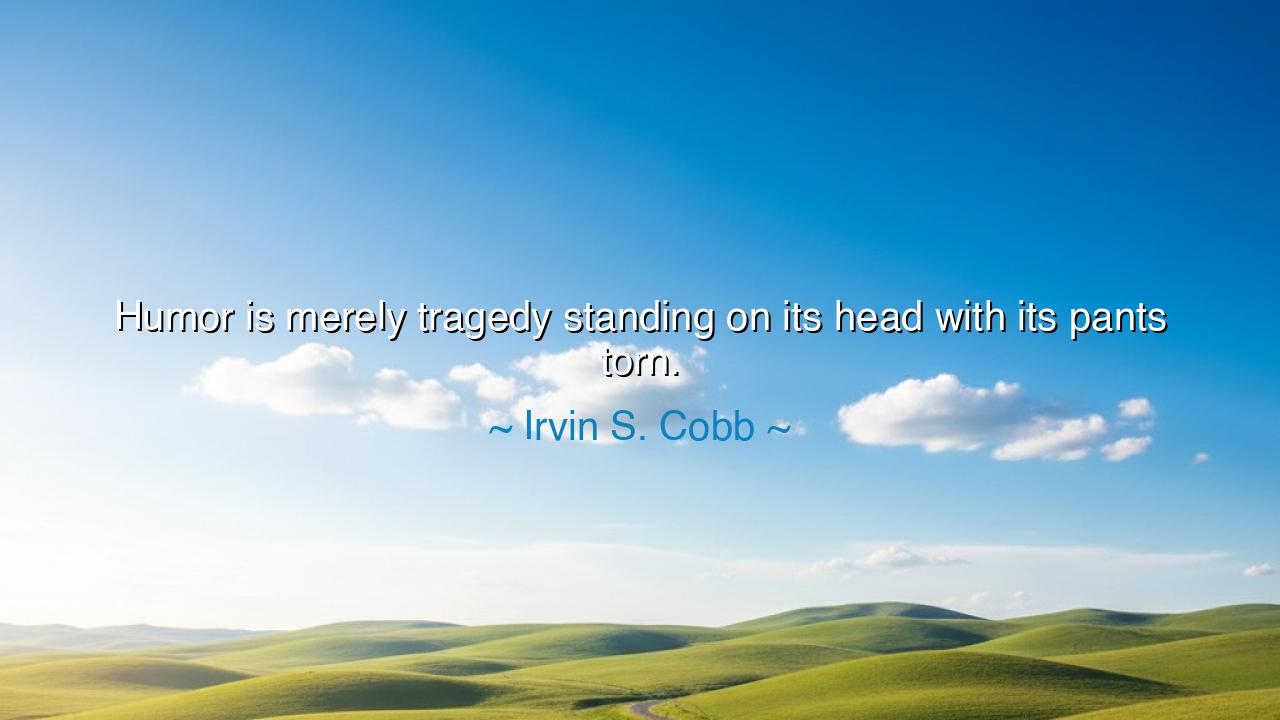
Humor is merely tragedy standing on its head with its pants torn.






When Irvin S. Cobb said, “Humor is merely tragedy standing on its head with its pants torn,” he revealed a profound truth about the duality of human experience: that laughter and sorrow are inseparable, that the grotesque absurdities of life often emerge from suffering itself. Humor, in Cobb’s vision, is not detached from tragedy; it is tragedy refracted through the lens of perspective and imagination. The mind turns calamity upside down, exposes its vulnerabilities — its “pants torn” — and in doing so, transforms despair into amusement, fear into insight, and pain into resilience.
The ancients understood this principle in both their theater and philosophy. Aristotle, in his Poetics, described tragedy as a vehicle for catharsis, and comedy as a complementary mirror, capable of revealing human folly while softening suffering. To stand tragedy on its head is to confront the weight of existence with courage, creativity, and a spark of irreverence. Cobb’s metaphor captures the essence of this ancient insight: humor is the playful, even rebellious, flip side of pain, a mechanism by which the human spirit refuses to be crushed by life’s relentless blows.
Consider the story of Charlie Chaplin, whose childhood was steeped in poverty, abuse, and hardship. His films, filled with slapstick comedy, absurd misadventures, and moments of absurdity, reveal exactly what Cobb describes. The Tramp falls, stumbles, and suffers indignities — yet the audience laughs, not because life is light, but because the tragedy of existence has been turned on its head. Chaplin’s humor, like Cobb’s description, is tragedy in disguise, made accessible and survivable through creative play and wit.
Cobb’s insight also illuminates the universality of humor as a coping mechanism. Life’s calamities, whether personal, societal, or cosmic, are relentless. The human mind, when faced with these inevitabilities, seeks release. Laughter becomes a form of resistance, a way of asserting agency over circumstance. To see tragedy with humor is to acknowledge reality without being overwhelmed by it, to survive suffering by rendering it absurd enough to endure. Humor, then, is both shield and weapon — a declaration that the spirit persists despite chaos.
A historical example emerges from the lives of soldiers during World War I. In the trenches, soldiers faced fear, death, and unimaginable hardship. Yet they told jokes, sang songs, and crafted absurd stories to lighten the unbearable weight of daily life. Their humor, standing “tragedy on its head with its pants torn,” allowed them to maintain sanity, camaraderie, and courage. Cobb’s metaphor is vividly embodied here: laughter is not frivolity, but survival, a means of reclaiming humanity in the face of relentless adversity.
Cobb also reminds us that humor is often grotesque, messy, and imperfect — as vivid as a figure with its “pants torn.” This imperfection is essential: it reveals the raw, unpolished nature of reality, and allows humor to penetrate deeply. Life is rarely elegant, and humor that fails to embrace the ragged edges of suffering risks triviality. The laughter that endures, Cobb suggests, is grounded in the recognition of pain, in the absurdity inherent in human vulnerability, and in the capacity to see the ridiculous in misfortune.
The lesson, therefore, is timeless: cultivate humor as a lens through which to perceive suffering, to transform adversity into perspective, and to assert resilience in the face of life’s inevitable tragedies. Cobb teaches that laughter is not a denial of pain, but an acknowledgment of it, reframed with imagination, courage, and irreverence. By embracing the absurdity of misfortune, we gain not only relief, but insight, and the capacity to endure.
In practical terms, this means observing life attentively, finding the absurdities hidden within misfortune, and allowing yourself to respond with creativity and levity. Share laughter with others, especially in times of difficulty, and recognize that humor is a tool of survival, a mirror that reveals both vulnerability and strength. As Irvin S. Cobb imparts, when tragedy stands on its head and bares its flaws, the human spirit discovers one of its greatest allies: the capacity to laugh, to endure, and to continue with courage, grace, and resilience.






AAdministratorAdministrator
Welcome, honored guests. Please leave a comment, we will respond soon